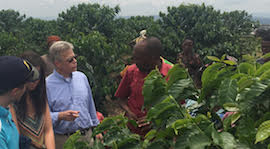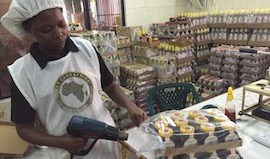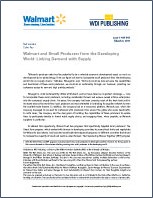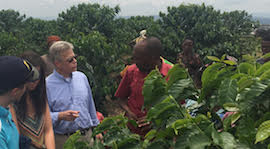After graduating from the University of Texas, Patrick Huang began his career as a management consultant while giving free advice to social entrepreneurs in emerging markets. But he soon wanted to do much more than dole out advice on the side, so Huang decided to get his MBA and join a social impact enterprise in an emerging market.

The Ross School of Business at the University of Michigan was at the top of Huang’s list of graduate schools, and “WDI was one of the key reasons,” he said.
“Ross and WDI stood out when I was applying because of its dedicated focus on the (base of the pyramid) in emerging markets through thought leadership and opportunities for students to engage directly in emerging markets through (student projects) and internships,” said Huang, now working with a startup enterprise in Kenya.
He enrolled at Michigan Ross in fall 2011 and that winter took part in a WDI-sponsored Multidisciplinary Action Project (MAP), an action-based learning course in which students work for a company or organization on a special task.
He was part of a four-person team working for the nonprofit charity CARE in Bangladesh, which was tasked with developing a micro-franchise pilot for small-scale businesses that sell agricultural inputs such as seed and medicine for livestock. The business plan included consolidation and coordination to improve efficiencies at the companies.
The team worked in a small farming town a few hours outside the capital of Dhaka. They often sat in huts and interviewed farmers and business owners.
“Although our team and our interviewees came from different sides of the world, we found common ground as we came to understand their challenges, their struggles, and most importantly, their ambitions for a better life,” Huang said.
That summer, he traveled to Mumbai, India as a WDI intern working for Village Capital, a peer-led business accelerator and investment program for early-stage social enterprises. Village Capital was planning to start two business accelerator programs, one focused on enterprises based in Mumbai and another sector-specific program for enterprises across India. Huang’s job was to recruit interested and qualified social enterprises across India to the program.

Huang poses with an elephant during his internship in India.
Huang soon discovered he not only had a knack for identifying potential businesses, he enjoyed it. He met with budding business owners, angel investors, and entrepreneur associations. He would meet them for coffee at a local cafe or for drinks during happy hour. He learned about each enterprise’s team, its business model and plans for growth.
“At the same time, I also learned about the city, the people, the culture,” he said. “I traveled across India from historical sights like the Taj Mahal to tea plantations in Kerala, absorbing and trying as much as I could. I sought to not only identify prospective businesses but also refine my own interests.”
By summer’s end, Huang had conducted preliminary due diligence and created a pipeline of 45 prospective early-stage, social enterprises.
“More importantly, I knew that I wanted to work in this environment where the growth of the entire country was almost tangible,” he said.
After graduating in 2013, Huang moved to Nairobi to work as a consultant for small- and medium-sized enterprises (SMEs). He now is chief of staff and principal business development officer at Umati Capital, a financial technology startup that provides financing alternatives for SMEs in agri-business, retail suppliers and consumer goods manufacturers in East Africa.
He said his WDI internship and MAP experiences “refined and strengthened my current passion for entrepreneurship as the driver for economic growth in emerging markets.” He also identified his role in this field – finding areas of collaboration and opportunity.
But to accomplish this with prospective clients in Kenya, he thought back to what he learned during those meetings over coffee in Mumbai and the interviews with farmers in their huts in Bangladesh. What made those projects succeed was Huang’s humility and empathy when interacting with people from a different culture or background. He also practiced “active listening” to show he was attentive and striving to understand. These are traits he applies in his work today.
“Only by understanding these lessons could I identify the common ground that served as our foundation to work together and achieve a common goal,” he said. “With my Ross MBA and my experiences at WDI, I am grateful for that opportunity, and look forward to working with businesses that can generate value for both the shareholders and the society as a whole.”
Note: This is one in an ongoing series of articles profiling past WDI interns and Multidisciplinary Action Project (MAP) team members and their career paths. Additional profiles in the series may be found here.
Ted London, vice president and senior research fellow of WDI’s Scaling Impact Initiative, has dedicated his career to exploring the role of business in alleviating poverty, particularly with respect to the base of the pyramid (BoP), defined as the 4-5 billion people who live on less than $3,000 per year. A key focus of his work is sharing what he has learned with aspiring entrepreneurs and future venture leaders through his MBA course, Business Strategies for the Base of the Pyramid, at the University of Michigan’s Ross School of Business.

In recognition of his impact, London has been named an Aspen Faculty Pioneer Award winner, given to innovative business professors teaching about the most pressing “grand challenges” faced by society today. London’s award also includes a “Building the Field” distinction that honors his long-term influence on building the BoP domain and shaping the next generation of business leaders.
Watch a video of London talking about his work here.
The awards, handed out by the Aspen Institute Business and Society Program, were established in 1999 to honor educators who exhibit leadership and risk-taking, and develop curriculum that studies the relationships between capital markets, firms and the public good. The Aspen Institute is an educational and policy study organization that provides a nonpartisan venue for dealing with critical issues.
“This year’s Faculty Pioneers are leading the charge toward a more modern version of business education,” said Claire Preisser, who manages the Faculty Pioneer selection process as associate director of the Aspen Institute Business and Society Program. “Against the backdrop of society’s ever-increasing expectation of firms, business education is still organized around preparing students to be profit maximizers – focusing them on financial, largely short-term measures of business success. Instead, our award winners equip students with the kind of problem-solving skills that firms need to make a positive impact on the most pressing issues of our time.”
London said he was humbled by the award and heartened to see his work in the BoP domain recognized.
“Our students seek to harness the power of enterprise to address society’s grand challenges, including poverty and inequity faced by the base of the pyramid,” London said. “Now more than ever, these students want strategies, frameworks and processes that guide and drive action. They also need to appreciate the unique opportunities and challenges of operating an enterprise in this demanding market environment.
“My goal is to provide them with both an action-oriented toolkit and the contextual knowledge needed to build scalable businesses with substantial social impact.”
His latest book, “The Base of the Pyramid Promise: Building Businesses with Impact and Scale,” was released earlier this year. WDI Publishing has also published many of his case studies.
In addition to London, Andrew J. Hoffman, Holcim (US) Professor of Sustainable Enterprise at Michigan Ross, was named a Faculty Pioneer Award winner. Hoffman and his graduate students have also authored many case studies found on the WDI Publishing website.
The William Davidson Institute’s (WDI’s) Scaling Impact initiative (SI) has completed its first year with a sharpened focus on assisting enterprises achieve scale in base of the pyramid markets, while completing several in-depth projects for building a toolkit of strategies, frameworks, and processes for business and the development community.

Under the management of Ted London, vice president of the SI initiative and WDI senior research fellow, the SI team has partnered with multinational corporations, global development agencies, non-profit organizations, and small- and medium-sized enterprises to grow their operations with the overarching goal of improving the incomes and well-being of low-income populations.
In a newly released video (see below) London explains how the SI initiative, previously known as the Base of the Pyramid (BoP), has evolved over time. WDI has long been a leader in analyzing and developing best practices in the BoP domain, and the SI initiative continues that legacy. But while many enterprises, from large corporations to entrepreneurs, embraced the concepts behind BoP and worked to incorporate low-income people into their business practices, few have achieved scale in meaningful ways. Recognizing this dynamic, the SI initiative was created and designed to help these enterprises manage growth, develop business models and forge partnerships in new ways.
Through extensive field research, customized advising and consulting, and by engaging multiple stakeholders, the SI team has developed a suite of new tools and methodologies tailored to different sectors, geographies and contexts.
“Our approach is what makes us distinct,” London says in the video. “We combine rigorous research with on-the-ground implementation. Working with our partners we identify the most relevant and impactful questions facing enterprises, analyze past successes and failures, and develop practical and actionable solutions.”
By generating new knowledge and translating it into actionable recommendations and strategies, the SI group is enabling partners from both the global development and business worlds. One example of these capabilities was demonstrated through a collaborative effort with one of the world’s largest retailers, Walmart. London and SI initiative Research Manager Colm Fay chronicled the history, the impact and the lessons learned by Walmart in its effort to bring smallholder farmers and female artisans from developing countries into its retail infrastructure in the report: “Incorporating Small Producers into Formal Retail Supply Chains”. Other companies and organizations can benefit from the Walmart experience, as well as from the accompanying Sourcing Readiness Checklist. The tool, created in partnership with Oxford University Consulting, enables organizations to assess sourcing strategies for more inclusive supply chains. The report, checklist and other resources may be downloaded here.
“Instead of asking whether business has a role in alleviating poverty, we look at how business can play this role more effectively,” Fay said. “In our research projects we aim to understand lessons learned and best practices, but also how this learning can be applied on an on-going basis to achieve sustainability and scale.”
Methods for creating partnerships and strategies for leveraging them is another research focus. A recent study by London and Fay, “Partnering for Scale: Collaborating to More Effectively Engage Smallholder Farmers,” offers important insights into how enterprises can enhance their performance through building an effective partnership ecosystem. Based on interviews with entrepreneurial and corporate-led enterprises in the agriculture sector in South Africa and Kenya, the research provides strategies for inclusive businesses looking to transition from an early pilot stage to scale.
Sharing these findings is critical to both the SI group and to WDI. It was the subject of a July 20 featuring London and presented by the Inclusive Business Action Network (IBAN), the World Business Council for Sustainable Development (WBCSD), and WDI. To watch a replay of the webinar, click here.
London also will host a July 28 webinar on Teaching Base of the Pyramid at a Business School. London will share his experiences in incorporating BoP content into one or more sessions within an existing course, or into an entire semester-long class. Leveraging material from his latest book, The Base of the Pyramid Promise, as well as topic-appropriate case studies, London will offer techniques, strategies, and lessons learned to enhance effectiveness in teaching this important topic.
This study was undertaken with the financial support of the Inclusive Business Action Network (IBAN). IBAN is a global multi-stakeholder network enabling and promoting inclusive business worldwide. It is implemented by the Deutsche Gesellschaft für Internationale Zusammenarbeit (GIZ) GmbH on behalf of the German Federal Ministry for Economic Cooperation and Development (BMZ).
The focus of this report is to shed light on the opportunity for inclusive business leaders to leverage partnerships to overcome the challenges they face in seeking sustainability at scale. Our findings, based on interviews with both entrepreneurial and corporate-led enterprises engaging with smallholder farmers in Kenya and South Africa, offer important insights on how these enterprises can enhance their performance through building an effective partnership ecosystem. In particular, we focus on addressing the following two questions for IBs seeking to transition from pilot to scale:
The “who” – Which partners should enterprise leaders prioritize as most crucial to enabling sustainable, scalable inclusive business development?
The “how” – Once these inclusive business leaders have identified their priority partners, what are the strategies and processes they will need to use to develop and maintain these relationships to maximize their effectiveness?
The William Davidson Institute (WDI) at the University of Michigan received a grant from Deutsche Gesellschaft für Internationale Zusammenarbeit (GIZ) through its Inclusive Business Action Network (IBAN) initiative to implement the project, “Selecting the Right Partners: Strategies to Support Inclusive Business Scaling.” The project built on prior research supported by IBAN to further understand the process of developing robust partnership ecosystems, specifically in context of Base of the Pyramid (BoP)-oriented inclusive businesses (IBs).
The project was made up of two main stages: Stage 1, Building the Right Portfolio and Stage 2, Partnership Building. During Stage 1, the question, “Which partners should enterprise leaders prioritize as most crucial to enabling sustainable, scalable inclusive business development?” was explored. Stage 2 focused on the question, “Once these inclusive business leaders have identified their priority partners, what are the strategies and processes they will need to use to develop and maintain these relationships to maximize effectiveness?”
During the past decade Walmart has opened up several channels for distributing products sourced from small producer enterprises in its stores and on its digital platforms. The overall purpose of the project is to present both the challenges and success factors involved when integrating small producers and enterprises, particularly artisans and small holder farmers, into the organized retail supply chain. The intention will be to help other businesses and organizations who wish to engage in such programs, and to show where the involvement of governments, NGOs, and other industry sectors is essential to achieving desired outcomes. The illustrations will include specific examples from Empowering Women Together and Walmart’s local food sourcing programs, both of which undertake to integrate small businesses and producers and women-owned enterprises into the supply chain. The project will result in both a policy brief aimed at the retail sector, and a teaching case that facilitates better understanding of the challenges and success factors in integrating small producers at the base of the pyramid into formal retail supply chains.
The William Davidson Institute (WDI) at the University of Michigan received a grant from Deutsche Gesellschaft für Internationale Zusammenarbeit (GIZ) through its Inclusive Business Action Network (IBAN) initiative to implement the project, “Selecting the Right Partners: Strategies to Support Inclusive Business Scaling.” The project built on prior research supported by IBAN to further understand the process of developing robust partnership ecosystems, specifically in context of Base of the Pyramid (BoP)-oriented inclusive businesses (IBs).
The project was made up of two main stages: Stage 1, Building the Right Portfolio and Stage 2, Partnership Building. During Stage 1, the question, “Which partners should enterprise leaders prioritize as most crucial to enabling sustainable, scalable inclusive business development?” was explored. Stage 2 focused on the question, “Once these inclusive business leaders have identified their priority partners, what are the strategies and processes they will need to use to develop and maintain these relationships to maximize effectiveness?”
This report was supported by a grant from Wal-Mart Stores Inc. and produced through a collaboration between The William Davidson Institute at the University of Michigan and Oxford University Consulting. It examines the lessons learned from Walmart’s engagement of small producers in developing countries in two arenas. The first includes a series of efforts over the past ten years to incorporate smallholder farmers into Walmart’s agricultural supply chain. The second effort, Empowering Women Together, endeavored to sell handicrafts made by women-empowering cooperatives through Walmart.com.
Increasing the productivity of small producers and facilitating access to markets, are key pathways to sustainable, and scalable poverty alleviation in developing countries.
This report was supported by a grant from Wal-Mart Stores Inc. and produced through a collaboration between The William Davidson Institute at the University of Michigan and Oxford University Consulting. It examines the lessons learned from Walmart’s engagement of small producers in developing countries in two arenas. The first includes a series of efforts over the past ten years to incorporate smallholder farmers into Walmart’s agricultural supply chain. The second effort, Empowering Women Together, endeavored to sell handicrafts made by women-empowering cooperatives through Walmart.com.
Increasing the productivity of small producers and facilitating access to markets, are key pathways to sustainable, and scalable poverty alleviation in developing countries.
Download Full Report
Download Executive Summary Only
To facilitate the process of evaluating sourcing scenarios involving small producers, we have created the Sourcing Readiness Checklist. Using this checklist, organizations can consistently assess how each potential sourcing strategy scores across the 18 influencing factors that are associated with four performance factors.
Download Sourcing Readiness Checklist

This case explores Walmart’s experience in incorporating small producers (women-owned or women-empowering artisan enterprises, and smallholder farmers) into its global supply chains. The case is written from the perspective of Kathleen McLaughlin, the president of the Walmart Foundation and chief sustainability officer at Wal-Mart Stores, Inc. This dual role gives her responsibility for exploring how best to link philanthropic activities with company resources to fulfill Walmart’s global social commitments while positively impacting business outcomes. The case opens with McLaughlin and her Walmart colleagues Kara Valikai and Chris Cochran contemplating the performance of both their Direct Farm and Empowering Women Together (EWT) programs, and how they might be enhanced going forward.
Download Case
This case explores the evolution of the cross-sector relationship between Wal-Mart Stores, Inc., Walmart Foundation and the U.S. Agency for International Development (USAID) from 2000-2015. It focuses on partnerships that sought to build the capacity of smallholder farmers in the developing world. The case explores the ways in which this collaboration came about, how it was supported by the partners, and the level of success achieved as measured by the Wal-Mart Stores, Inc., Walmart Foundation, and USAID. The case dilemma is to identify learnings drawn from these partnerships and determine how they can be applied to a more ambitious approach to collaboration. From Walmart’s perspective, further collaboration with USAID could result in a partnership strategy that yields both significant social impact and important business outcomes. However, the partnership model had to enable innovation and flexibility, while maintaining efficiency, sustainability, and scalability.
Download Case
A new report co-written by WDI’s Scaling Impact Initiative that investigates Walmart’s efforts to incorporate small producers into its global supply chain was presented today at the 7th Annual Global Entrepreneurship Summit 2016. The summit, held in Silicon Valley, Calif., is one of the foremost gatherings of the world’s preeminent entrepreneurs and featured a keynote address by President Barack Obama.

“Incorporating Small Producers into Formal Retail Supply Chains” focuses on lessons learned by Walmart in its efforts to bring smallholder farmers and female artisans from developing countries into its retail infrastructure.
An earlier WDI study, which was turned into the teaching case “Walmart and USAID: The Evolution of a Global Cross-Sector Partnership,” examined Walmart’s attempts over the past 10 years to bring smallholder farmers into its agricultural supply chain in partnership with USAID. Linda Scott, Emeritus DP World Chair for Entrepreneurship and Innovation at Saïd Business School at the University of Oxford, had previously looked at the retailer’s efforts to sell the handicrafts made by women-owned businesses through Walmart’s online consumer marketing.
For the report presented at the summit, the research team consisting of Ted London, vice president of the Scaling Impact Initiative, Colm Fay, research manager of the Scaling Impact Initiative, and Scott, interviewed key stakeholders, analyzed relevant data, and developed a set of strategies and frameworks based on Walmart’s experiences in Africa, Asia, and Latin America.
Walmart had mixed success in its efforts to engage with smallholder farmers and artisans, and was interested in understanding and sharing what had worked and what had not.
“They faced some real challenges and they wanted to share these with the broader community,” Fay said.
While difficult, success is possible. The report found that small producers could be integrated into the global supply chain of a large retailer. The key is understanding the current capabilities of the supplier, as well as key aspects of the product, market, and ecosystem in which the product operates.
In order for small producers to be successful, retailers, development organizations and local governments may need to partner and invest in things such as improved credit systems, transportation, and market information.
The paper identified four performance dimensions and 18 influencing factors that indicate whether a retailer could successfully engage with a small producer. A Sourcing Readiness Checklist provides an actionable approach for retailers to systematically assess whether their sourcing strategies are likely to have a positive impact.
London said the report should provide insights for other formal retailers who are already engaging with small producers or are considering it.
“We don’t just need to encourage retailers to engage with small producers, we need to help these retailers execute more effectively,” he said. “That’s the real goal and the focus of the report.”
London also said that a teaching case for WDI Publishing will be developed out of this latest project.
The report and checklist are available to download free on WDI’s website at: www.wdi.umich.edu/walmart.
Photo credit: Shankar S. on Flickr
Ted London, WDI Senior Research Fellow and Vice President of the Scaling Impact Initiative, authored the following post for NextBillion.net in which he describes a new framework for creating partnerships that help enterprises achieve sustainable, scalable impact. This article was originally published May 16, 2016 on NextBillion.

If you’ve worked in any industry or sector long enough, you start to see some patterns.
I have been working in the base of the pyramid (BoP) domain since 1989. During that time, I have been fortunate to engage with many entrepreneurs and business leaders seeking to develop and launch enterprises in BoP markets. When I first meet these entrepreneurs, they are excited and passionate about their potential impact. They have a product or service and a proposed business model. Often they have won some sort of business competition or have some internal corporate seed funding. They are on their way, with the next big milestone being additional capital.
These are smart, committed people. Some have come to this point in their lives with substantial business experience in developed world markets. Others are fresh out of school. As we run into each other over time, I see the same thing happening again and again. They begin to recognize how much they didn’t know about BoP markets, and all of this leads to a déjà vu scene that has happened all too often:
“We thought we knew what we were doing, but we have made all the mistakes in the book,” lamented a colleague, who is an experienced entrepreneur in the technology industry. He believed his experience as a successful top-of-the-pyramid entrepreneur would translate well into a BoP context. It didn’t work out that way for him – or for many others.[1]
BoP entrepreneurs and enterprise leaders aren’t destined to repeat his experience. But first we need to change our thinking and adopt new tools to keep us from falling back into old patterns.
For too long, the implicit assumption seems to have been that each enterprise has to respond in a unique way to the specific context it faces. This thinking has downplayed the value of understanding lessons learned and the opportunity to use experience – both successful and less so – to understand best practices.
To be sure, each BoP enterprise faces a distinct context. But so does each enterprise in the developed world. Yet that hasn’t constrained the development of strategies, tools, frameworks and processes that business leaders can use to navigate the complexities of the environment in which they operate. To name just a few, there are Porter’s five forces, the four Ps of marketing and the SWOT analysis. What each of these has in common is a standardized framework that can then be customized to reflect the local realities that different enterprises face.
These frameworks, however, were designed for developed world markets. BoP enterprises operate in an impoverished environment and seek to serve impoverished people. While BoP enterprise development is not about reinventing the principles of business – enterprises must create the right internal design, plan for scale, build a viable value proposition and seek the right partners – it is about recognizing that these principles need to be applied in different ways. This means that the frameworks made for the developed world may not be sufficient or correct.
What we need is a toolkit that is specifically developed with the BoP context in mind. BoP enterprise leaders need standardized frameworks that they can modify to their unique context. At the very least, such a guide will help these enterprise leaders avoid some classic mistakes that many BoP ventures seem to make over and over, while providing a roadmap for their journey to scale.
The good news is that as a community we have begun to develop a set of tools, frameworks and strategies derived from examining and understanding success and disappointment in the field. These include the Business Model Innovation Framework (for developing an appropriate internal design), the Co-create, Innovate, Embed Framework (for moving from design to pilot to scale) and the BoP Impact Assessment Framework (for building a viable value proposition from the perspective of the BoP). These are all valuable tools and methodologies for managing growth and impact. I am proposing that we add the Partnership Ecosystem Framework (PEF), a tool that helps prepare the enterprise for building the cross-organizational collaborations needed for sustainability at scale.
In exploring partnerships, enterprise leaders have been guided by an interesting but incomplete question: “Who should we partner with?” While helpful, this question also sends BoP entrepreneurs and business leaders down a false path. Indeed, the trap for too many BoP business leaders is to focus on finding one partner – often someone who can provide financing – or finding partners in a sequential manner, one after the other.
A better question is: “How can we build a robust and evolving partnership ecosystem?”
Operating in an impoverished market with impoverished consumers and producers means that the enterprise faces a market environment where key building blocks may not exist, or may operate in very different ways. To overcome these gaps in a cost-effective manner, enterprise leaders must consider a range of potential partners that can provide support across a wide range of functions – for example, helping to facilitate operational activities, providing access to needed financial and other resources, influencing supply and/or demand or otherwise enhancing the context in which the enterprise operates.
Getting the question right is a good first step, but doesn’t fully solve the problem. The enterprise’s leadership team must still develop a proactive and effective partnership strategy that maximizes access to the resources available from potential partners. And these partners use a variety of approaches, including business accelerators, impact investment funds, last-mile distribution and strengthening market systems, to support to BoP enterprise development.
This is where the PEF comes into play. It is a standardized framework that allows enterprise leaders to strategically consider who should be in their partner ecosystem. By customizing to their specific situation and content, these enterprise leaders can systematically understand their capability set, their current partner portfolio, and then assess where the key partner needs remain.
The PEF organizes support from partners based on the focus and type of that support. As shown on the horizontal axis, support can target either enterprise development or market creation. The former provides support directly to specific enterprises. The latter focuses on creating a better market environment, which can benefit all enterprises serving that market.
Meanwhile, differences in the type of support are captured on the vertical axis. Support directed at capacity building increases the stock, or the value of assets, including an enterprise’s resources or a market’s infrastructure. Support directed at action enabling enhances the flow, or the total value of transactions, by facilitating enterprise activities and market transactions.[2]
This generates four quadrants that capture the landscape of support that can be provided by potential partners (see Figure 1 for a subset of possible support from partners). The result is a diagnostic tool that enterprise leaders can use to develop and manage their partnership portfolio.
The PEF is a standardized framework that BoP enterprise leaders can customize to their own situation. Our work in the field has shown the value of such an organized approach.[3] These leaders can better: 1) assess where partnership support is most crucial, 2) plot their existing set of partners and the support they are currently providing, and 3) identify key gaps that remain. This leads to actionable strategies that enable a BoP enterprise to build and maintain an integrated and evolving ecosystem of partners that responds to key challenges in the enterprise’s journey to sustainability and scalability.
This is a key part of the future of BoP enterprise development – standardized strategies, frameworks and processes that can be customized to the local context. At the very least, these will help enterprises avoid some classic mistakes. Better yet, this toolkit of frameworks can offer a blueprint for increasing the likelihood of an enterprise’s success.
Ted London is Vice President and Senior Research Fellow for Scaling Impact Initiative at the William Davidson Institute. He is also a faculty member at the Ross School of Business at the University of Michigan. His most recent book is The Base of the Pyramid Promise: Building Businesses With Impact and Scale.